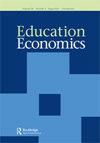评分中的性别差异:教师偏见还是学生行为?
IF 0.9
Q3 Social Sciences
引用次数: 0
摘要
本文考察了教师评分行为在性别上存在的系统性差异,以及这些差异是否可以归因于教师偏见。这项研究通过比较教师的成绩和国家考试来衡量这些差异,这些考试是外部匿名标记的。与文献一致,教师评分的性别差异对男孩不利。这项研究使用了一个班级-学科层面的性别差距数据集——它允许随着时间的推移跟踪不同班级的教师——表明,教师的评分行为并不是跨班级持续的。结果表明,学生行为的差异可以解释性别评分差距。本文章由计算机程序翻译,如有差异,请以英文原文为准。
Gender differences in grading: teacher bias or student behaviour?
This paper examines the presence of systematic differences in teachers' grading behaviour across gender and whether these can be attributed to teacher bias. This study measures these differences by comparing teachers' grades with national exams, which are externally and anonymously marked. Consistent with the literature, the gender gap in teacher grading is against boys. Using a dataset with gender gaps at class-subject level – which allows to follow teachers in different classes over time – this study shows that teachers' grading behaviour is not persistent across classes. Results suggest that gender grading gaps are explained by differences in students' behaviour.
求助全文
通过发布文献求助,成功后即可免费获取论文全文。
去求助
来源期刊

Education Economics
EDUCATION & EDUCATIONAL RESEARCH-
CiteScore
2.00
自引率
8.30%
发文量
38
期刊介绍:
Education Economics is a peer-reviewed journal serving as a forum for debate in all areas of the economics and management of education. Particular emphasis is given to the "quantitative" aspects of educational management which involve numerate disciplines such as economics and operational research. The content is of international appeal and is not limited to material of a technical nature. Applied work with clear policy implications is especially encouraged. Readership of the journal includes academics in the field of education, economics and management; civil servants and local government officials responsible for education and manpower planning; educational managers at the level of the individual school or college.
 求助内容:
求助内容: 应助结果提醒方式:
应助结果提醒方式:


